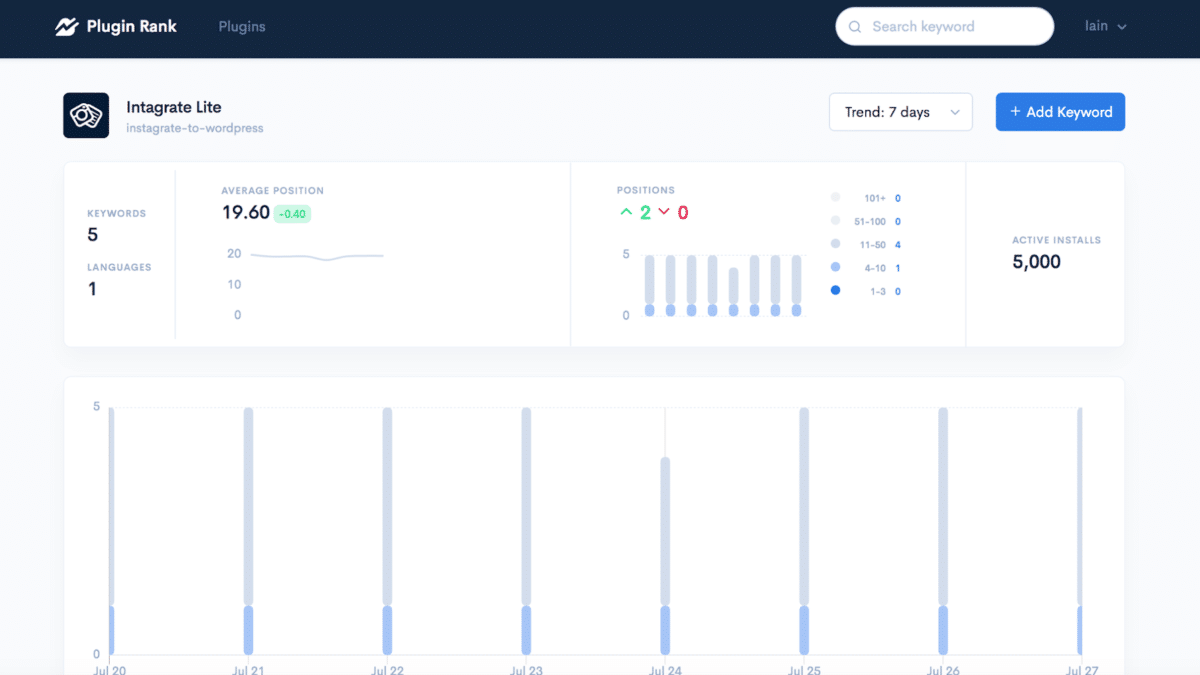Iain Poulson announced that Plugin Rank is open to the public yesterday. It is a new service that allows plugin authors to track their rankings by keyword on the official WordPress plugin directory. The service is geared toward plugin authors with freemium offerings.
The tools were already in place for Poulson to build the service. He just needed to build his service on top of them. “Plugin Rank leverages the WordPress.org API to retrieve a set of plugins for a search term,” he said. “It’s the same API that WordPress uses when a user searches for a plugin inside their WordPress dashboard or when searching on the plugin directory.”
Poulson described how a user might search for a membership plugin by typing “membership” in the search box. The WordPress API returns a set of plugins that best match that term, based on an internal ranking algorithm. The Plugin Rank service uses this same, underlying technology.
“Plugin Rank will check the API daily to find the latest positions of the plugins for the keywords being tracked by Plugin Rank customers,” he said. “This data is then used to show position movement and charted to show an overall picture of how the plugins are ranking.”
 Plugin dashboard screen.
Plugin dashboard screen.
The idea for the service was born from work he and others were doing at Delicious Brains, a WordPress development company, a few months ago. “We’d started to work on improving the copy in the WP Migrate DB plugin readme.txt files to rank higher in search results,” he said. “Brad Touesnard set up a Google sheet with all the keywords we wanted to rank for, a link to search the keyword on wordpress.org, and columns for each month. He started to record the position the plugin appears for each keyword every month. Or that was the idea, when we remembered!”
Poulson began using the same system for WP User Manager and Intagrate, two freemium plugins he had in the plugin directory. However, it did not take long to realize the futility of that system.
“The sheer manual nature of the task of setting up the sheet, monthly checking, and trying to remember to do it made me think there must be a better way,” he said. “So I started to work on an app to do it for me.”
Besides simply providing a particular plugin’s rank, Poulson said the service provides information that can help plugin developers raise their rankings in the search results.
 Competitive analysis against other plugins.
Competitive analysis against other plugins.
“The competitor analysis in Plugin Rank gives you an insight into the top 50 plugins that rank for the keywords you care about,” said Poulson. “It gives you insights into what those plugins are doing that make them rank higher than you. Do they have a high amount of the keyword in their readme? Do they have it in their title or tags? Do they answer the bulk of their support requests? Do they have a large number of five-star ratings?”
A Premium Service with a Premium Price
Plugin Rank is the first service of its kind in the WordPress industry. Therefore, Poulson had to look outside of traditional WordPress channels to get a sense of how to price the new service.
“I looked at similar SEO tools for traditional search engines, like Ahrefs and SEMrush, and tried to base my pricing on how valuable it can be in relation to other marketing channels,” he said.
Only time and feedback will decide whether he found the sweet spot between offering a valuable service and what plugin developers are willing to fork over. The Starter tier allows plugin authors to track up to five keywords for a single plugin. It also includes email reports and competitor analysis. The $9 per month price tag is low enough for developers to dip their toes in and decide whether it is worth upgrading for tracking more keywords and plugins.
The $49 Plus plan allows up to five plugins and 50 keywords. It also includes tracking for multiple languages. The $119 Pro plan bumps the plugin count to 20 and keyword number to 500.
Right now, Plugin Rank is offering a 21-day free trial, which is a no-brainer for any freemium plugin author who might even be remotely interested in the service. I have no doubt I would sign up if I was still in the freemium plugin game.
“Most developers and companies will invest heavily and get good results from content marketing and SEO improvements, and their WordPress.org plugin listing will receive little attention,” said Poulson. “But for freemium plugins, it can be a huge channel for getting people using their plugin and buying the up-sells. So it’s priced with that in mind.”
The Future of the Service
The knowledge of where a plugin stands in the rankings and having the data readily available will undoubtedly help many plugin authors. However, knowledge is merely the beginning of ranking higher. For developers who are not well-versed in marketing and SEO, they will need to develop new skills to make full use of what they learn from the service.
Poulson seems interested in expanding the service beyond its initial goal of providing ranking data. Tutorials, videos, and other resources would be a nice value-add for those who buy into the service now.
“Plugin Rank’s primary functionality at the moment is monitoring and getting access to data,” he said, “but I’ve got features planned that focus on how to make improvements, as well as tutorial-style content on the Resources page.”





